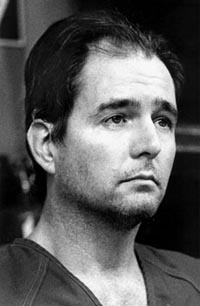Convicted serial killer 'calm' before execution for murders of five Florida college students
Danny Harold Rolling, the state's most notorious serial killer since Ted Bundy, was "remarkably calm" as he awaited his execution for the grisly 1990 slayings of five college students in Gainesville, his attorney said.

Rolling's lawyers filed papers Tuesday with the U.S. Supreme Court seeking a stay of execution. The Florida attorney general asked the court to reject Rolling's application.
Rolling, 52, is scheduled to die at 6 p.m. (2200 GMT) Wednesday for a reign of terror that paralyzed Gainesville as the University of Florida's fall semester was beginning 16 years ago.
"He was remarkably calm. He is a lot calmer than his lawyers are," said Baya Harrison, his appeals lawyer. He said that Rolling told him: "I don't want to die, but it looks like I'm going to die."
His execution is reopening old wounds for some of the victims' families. Several relatives plan to watch the execution at Florida State Prison in Starke, including Diana Hoyt, the stepmother of Christa Hoyt.
"This is a tough thing, but is a necessary thing to go through," she said. "This is the final thing we can do for Christa and for my late husband and her dad, Gary."
"It is very hard for us to see someone else die," she said. "But, he deserves it."
Ricky Paules, the mother of victim Tracy Paules, will be joined by another daughter: "If you see us crying, it is not for Rolling, but for Tracy."
The students' bodies, some mutilated, posed and sexually assaulted, were found over a three-day period in August and September 1990. The killing spree touched off a massive manhunt, causing students to cower in fear and purchase weapons as the killer remained unidentified.
Rolling was in jail for a supermarket robbery when investigators used DNA to link him to the killings months later. When he was finally scheduled to go on trial in 1994, he shocked the courtroom by pleading guilty to the five slayings.
Rolling's remaining appeal contends that the chemicals used in Florida's execution process can cause severe pain. It is before the U.S. Supreme Court, which has turned down the same arguments in two other Florida executions this fall.
Harrison does not believe he will be able to halt the execution, reports AP.
"It's tough, we are down to the last effort," Harrison said. "I'm not hopeful, to tell you the truth."
Crowds are expected outside the prison Wednesday, with possibly the largest turnout since Bundy's execution. Bundy was suspected in the deaths and disappearances of 36 women across the country. He was electrocuted Jan. 24, 1989, in the same death chamber where Rolling will die by lethal injection.
Subscribe to Pravda.Ru Telegram channel, Facebook, RSS!


